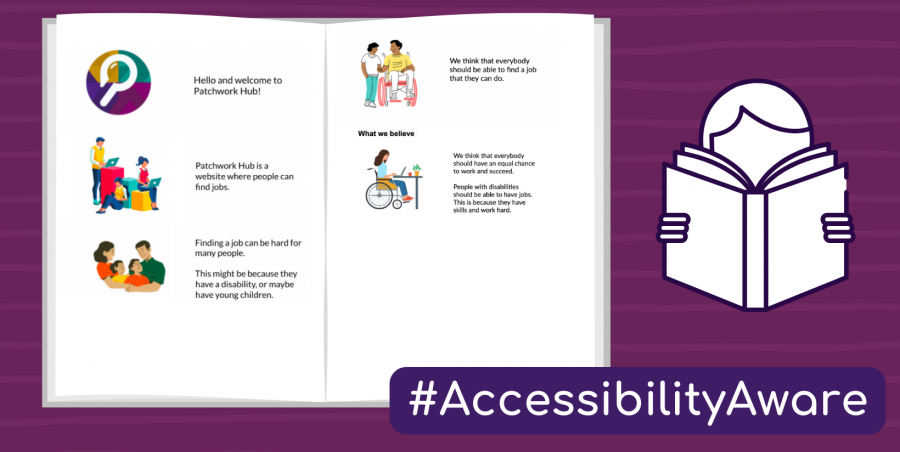-
Resources and Support, Health and Disability, Carers, Looking for work, Staying in work, Organisations, Employers,Blog Views
566
What is Easy Read?
Information on the internet should be accessible to as many different people as possible. Easy Read is a globally standardised method of simplifying documents in a range of formats, from leaflets to news articles and other publications. Easy Read involves creating alternative versions of text, relating short sentences with relevant images. The aim is to remove barriers to understanding for individuals with learning disabilities.
How did it start?
The concept was introduced in the 1980s in Sweden. Spreading through Europe in the 1990s, it is now implemented by more than 66 countries worldwide.
In the UK the first-ever Easy Read resource was a government document called ‘Valuing People: A New Strategy for Learning Disability for the 21st Century’. Starting as a way of delivering public information, it is becoming more readily available in a wide range of contexts. It is also a simpler, visual alternative to the standard format of everyday information. This can work well for anyone, with or without a learning disability.
The main characteristics of Easy Read
These can be broken down into three broad categories:
Words
-
Language should be simplified when possible, so avoid complex and unnecessary words.
-
If you do use difficult terms, explain what these mean by using simpler words.
-
The text should be in a larger font, at least 14pt.
-
Use clear fonts such as Lato, Comfortaa and Arial. Avoid fonts like Times New Roman, Courier and Copperplate Gothic.
Images
-
Images should be easy to understand and not overly complicated.
-
They should be big enough so they can be seen clearly.
-
Add ‘alt texts’ to images for individuals who use screen readers.
Structure
-
Each sentence or idea needs an image to relate to it.
-
Images go on the left-hand side of the page and the corresponding text goes to the right of it. This helps individuals to understand the textual information.
-
Ensure that it’s clear which pictures support each bit of text.
-
The text should be broken into smaller sentences. Sentences with more than 15 words are hard to read and should be avoided.
-
Sentences should be separated, and not in large paragraphs.
-
Documents should have clear headings and subheadings.
-
Documents should be short where possible. As a rule, try not to exceed 20 pages.
An example of Easy Read
The best way to understand what an Easy Read document is, is to see what one looks like.
Here is a short example we’ve put together at Patchwork Hub. This is how we might introduce our company in the form of an Easy Read document:
Introduction

Hello and welcome to Patchwork Hub!

Patchwork Hub is a website where people can find jobs.

Finding a job can be hard for many people.
This might be because they have a disability, or maybe have young children.

We think that everybody should be able to find a job that they can do.
What we believe

We think that everybody should have an equal chance to work and succeed.
People with disabilities should be able to have jobs. This is because they have skills and work hard.
What can we take away from this example?
-
Each image has short, ‘easy to read’ sentences next to them.
-
The images and text are both large, making it easier for individuals to understand them.
-
We chose simple and clear fonts.
-
We made sure that sentences are separated by spaces and aren’t clumped together.
-
We have bold subheadings for individual sections.
Summary
Web-based information must be accessible to a wide variety of users. Easy Read is a universally standardised method of converting documents into more easily understandable formats. In short, Easy Read involves creating simplified versions of documents that relate short sentences with relevant images.
Though often created for people with learning disabilities, it can also benefit people with other conditions that affect information processing.
Here at Patchwork Hub, we’re dedicated to making the internet a more accessible place. Has this blog inspired you to take action and make your documents more inclusive? We’d love to hear your thoughts in the comments below!
Published: 28th March 2022
Tags
All Tags
Ability Connect Academy for Disabled Journalists Academy for Disabled SEO Specialists Access2Funding Accessibility Accessibility information Accessibility int he workplace Accessibility ramps Accessible education Accessible locations Accessible places Acid reflux Adaptive fashion Advocacy AI Aleto Foundation All Saints Alt text Aspiring Entrepreneurs with Disability Development Programme Assistive technology Autism Awareness Barriers Beth Kume-Holland Blog Budgeting Bullying BUPA Burnout Business Business Disability Forum Business model creation Business skills Business workshop Businesses Cancer Candidates Captions Cash flow Cerebral palsy Characters Charity Charity sector Chronic pain Closed captions Clothes Clothing Cognitive disabilities Comfort zone Communication Community networks Companies Company Company Corner Company culture Confidence Confucius Consultant Consultation Content creator Content designer Data talent Diagnosis Difference Digital and social media marketing Digital transformation Disabilities Disability advocate Disability advocates Disability and Neurodiversity Network Disability awareness Disability Awareness Training Disability community Disability confident Disability Confident Leader Disability employment Disability inclusion Disability news Disability Policy Centre Disability Pride Disabled Disabled candidates Disabled community Disabled founders Disabled people Disabled People’s Direct Action Network Disabled talent Disabled team Disabled-led Diverse Diverse workforce Diversity Diversity and inclusion Diversity Project Diversity Recruitment Platform Domestic violence Dysfluency ED&I EDDP Education Education and resource platform Employment opportunities Employment platform Empowerment Equality Act 2010 Ethnic minorities Eventbrite Expert teachers Expert training Fashion Fashion industry Fathom Feedback Finances Financial goals Financial planning Financial plans Financial services Financial services sector Flexible work Freelance FTSE 100 Fund management GAIN Game Gaming Gareth Walkom Garment technologist Gastrointestinal conditions Gem Turner Gender Gender Networks Grant Logan Guide dog Healthcare Hidden talent pool Homeworking Hospice UK Compassionate Employers Programme HR Hybrid working Ian MacKenzie Inclusion Inclusive culture Inclusive workforce Inclusivity India Inspiration Intellectual capabilities Interview process Interviews Investments Invisible disabilities Invisible disability Isaac Harvey Isaac Harvey MBE Istituto Marangoni Jack Wills Job descriptions Job interviews Job opportunities Job vacancies Journalism Journalists Learning disability Leeds Leeds trinity university Legislation LGBT Great LGBTQ+ Limb-pelvic hypoplasia LinkedIn LinkedIn influencer Listening service Lloyds Bank London London Fashion Week Long-term health condition Long-term health conditions Mapping days Mark Esho Matt Pierri Maya angelou Meta Metaverse Migrants Motivation Multinational firm Musculoskeletal conditions National Council for the Training of Journalists NCTJ Neurodivergence Neurodivergent Neurodiverse Neurodiversity consultant Neurodiversity space Neurotype Neurotypes New Delhi News Non-disabled founders Non-profit Novos OBS Occupational health Office environment Organisations Partially sighted Partnership Patchworkers People Phase Eight Phone calls Physical disabilities Pirate video games Policy Poverty Presentations Pride Network Primark Processes and systems Professional Women’s Network Progress Together Public speaking Puneet Singh Singhal Race Race and Ethnicity Network Raising awareness Registered blind Remote course Remote education Remote learning Remote work Removing barriers Resilience Revenue streams Rights School Scoliosis Scope Search engine optimisation Selection process Self-employed Self-employment Senior staff Sexuality Shaw trust Shaw trust power 100 list Sign language SJP Small Business Britain Social impact Social mission Social mobility Social-emotional learning Social-emotional learning platform Software Speaking situation Speech differences Speech disabilities Speech impediment Spotlight series Spotlight stories Ssstart St. James’s Place Charitable Foundation Staff Stammer Stammering Stonewall Stories Stuttering Sustainable change Sweaty Betty Target market Tech industry Tech talent TEDx Tesco Think tank Training Underrepresentation Unhidden Unhidden Clothing Universities University of Leicester Vanessa Castañeda Gill Victoria Beckham Video editor Video game Vimeo Violence Virtual reality VR Wealth management Web accessibility Wheels and Wheelchairs Women Work environment Work from home Working conditions Working Families Group Working from home Workplace adjustments Youth Zoom Abc Ability Today Access to work Accessibility in the workplace Accessibility test Accessible work Acting Adhd Adjustments Administrative Adrian lord Advice Advocacy and campaigns Allparty parliamentary group for inclusive entrepreneurship American civil rights movement Android Anglonorman App Artificial intelligence Bad grammar Barriers to work Bbc Benefits Blind persons act Blue badge Blue badge service specialists Care Career Carer Celtic languages Center on everyday lives of families Ceo Cfs Chloe tear Chronic fatigue syndrome Chronic health condition Chronic illness Commodo aute beatae Community Community story Community, community story, founder, feature, accessible work, disability employment gap, making a difference Companies house Compressed hours Computer science Computers Coronavirus Councils Covid19 Crystal mark standard Deaf Design Dialects Dictionary Digital accessibility Disability Disability discrimination act Disability employment gap Disability rights movement Disability services Disabled peoples direct action network Disabled persons employment act Disabled-led organisation Easy read Edit Tag Test 2 Email address Employer Spotlight Employers Employment English English speakers Entrepreneur Entrepreneurship Epilepsy Equality Equality act Equality and diversity Equality of access Esources, disability, disability services, support services, community story, features, adjustments, social support network Esse vero eum nisi a Eugenics Facebook Feature Features Fibromyalgia First world war Flexi Flexible working Flexitime Flextime Founder Francesco cirillo Freelancing French Gcses Gdpr General data protection regulation Good Good grammar Google Government policy Government support Graduate Graduates Grammar Grammar schools Health Health condition Health conditions Hearing impairment Help And Support Tags History History of language Holistic Ico Impact Imposter syndrome Inclusive entrepreneur network Inequalities Inequality Information commissioners office Information governance Instagram Internet Jacqueline winstanley Laborum Magna moles Language Latin Law Learning difficulties Lexicographers Limited company Local councils Local government Making a difference Marketing strategy Mecfs Medical conditions Medical model of disability Medical vs social models of disability Medicines Mental health Middle english Mindfulness Mlm Mobility issues Molestias quod sapie Multilevel marketing Nam eaque iure aut v National league of the blind Neurodiversity Nihil corporis aliqu Niya Normans Old english Old french Onboarding and retention Online Out of work Oxbridge Parent Passwords Patchwork hub Payment details Planning Planning for work Podcasts Pomodoro Preposition Private schools Psychiatric Psychiatry Punctuation Qui voluptatem debi React Reasonable adjustments Recruitment Remote working Resources Resources and support Rest Retinopathy of prematurity Sales Scam Search engine Second world war Shell shock Slang Sociability Social Cipher Social interactions Social media Social model of disability Social support network Socialising Spelling Spoken language Spotlight series Spotlight stories St. James’s Place Standard english Startup State schools Student Students Studying Suffragette movement Support Support services Syntactician Syntax Tag Technology The Disability Policy Centre The elderly Then barbara met alan Trafalgar square Turkish United nations Universal inclusion University University of arts london University of cambridge University of hertfordshire University of hull University of leeds University of oxford Victoria Jenkins Visual impairment War Ways of working West germanic dialects William shakespeare Windsor consultations WithVR Wordpress Work structure Workforce recruitment Working environment Workplace barriers World war one World war two Young carer -




